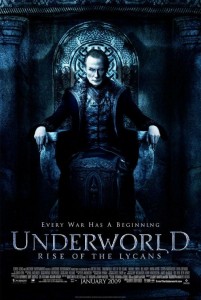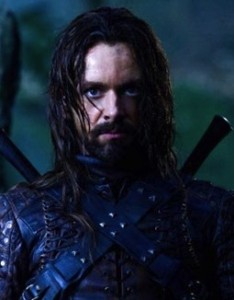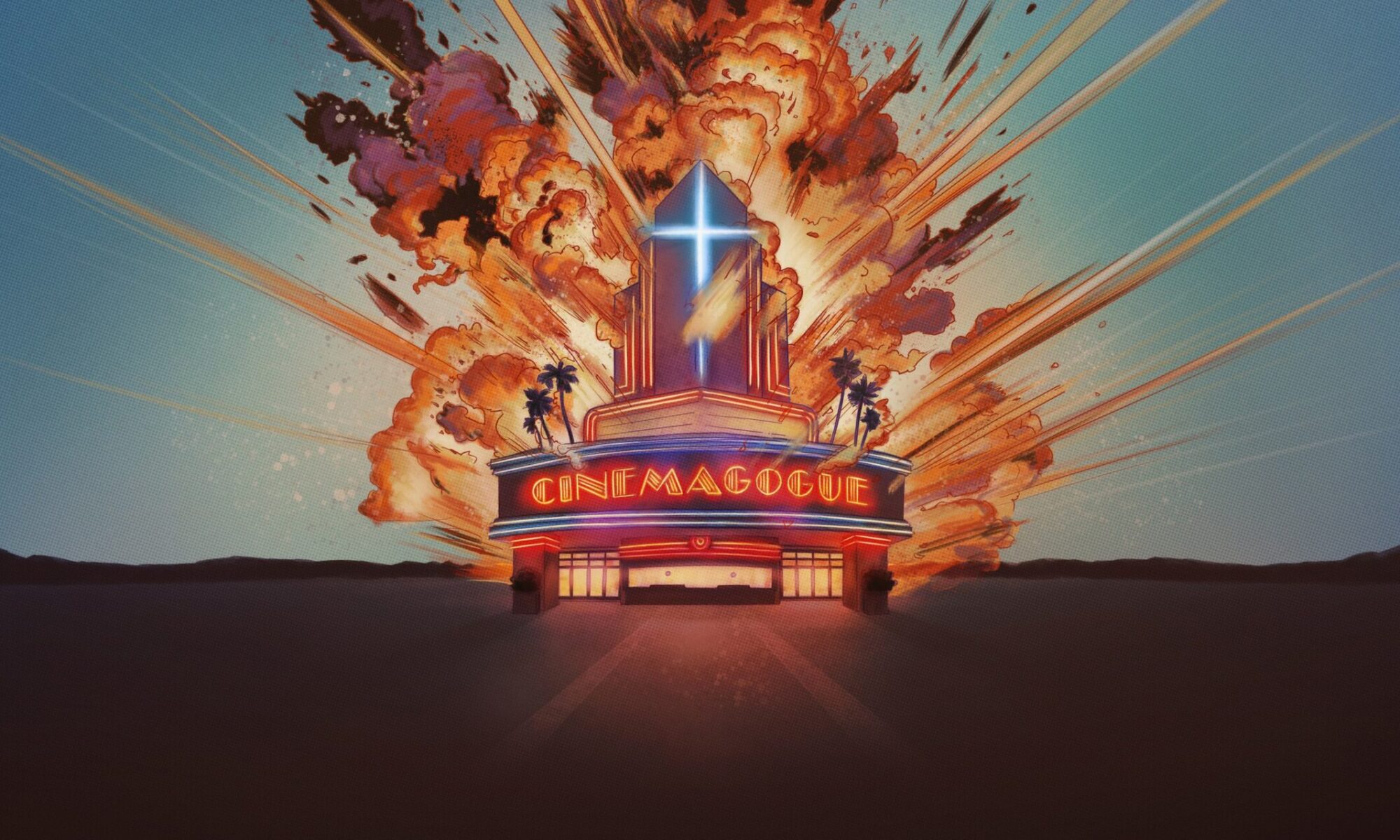 Viktor: I gave you your life.
Viktor: I gave you your life.
Lucian: You gave me chains.
Viktor: I thought you would have learned by now after all these years; you cannot have one without the other.
Underworld: Rise of the Lycans may be the least liked installment of the series. Some cite the absence of Kate Beckinsale as Selene, while some might point to the change of director (first-time director Patrick Tatopoulos, best know for his F/X work on movies like Independence Day). Since the others aren’t exactly high art, I disagree; they all reside on the same popcorn playing field. Michael Sheen reprising his role as Lucian, and Bill Nighy back as Viktor, make up for the absent Beckinsale, and Rhona Mitra adequately plays Sonja, Viktor’s daughter… whose appearance would later inspire the vampire elder to sire Selene to fill the void of her loss. The two look enough alike to make this prequel work, bringing the Underworld story full circle in a medieval tale that echoes the most classic narratives of being set free by a miraculous hero. Resonance of biblical proportion abounds, from Moses to Jesus, as the enslaved Lucian rises up to liberate his people from slavery.
Similar to Anakin Skywalker (and perhaps a non-fictional savior) the narrative introduces us to Lucian as the product of a miraculous, inexplicable birth. He is different from his mindless Lycan brothers, gifted, but he and his kind are kept as a slave race by the coven of vampires under Viktor’s cruel reign. Without even thinking twice, he risks his life and freedom, suffering flogging and the threat of painful death not simply for his Lycan brothers, but to protect his beloved bride. His goal is not only his own liberation, or simply escape for his Lycan kind, but to free his bride from the merciless father of the dark world where they can be together forever.
 “I have no wish to remove one shackle from around your necks, only to replace them with one of my own. You’ll have a choice: you can run and hide, or you can stay and fight. Any man who fights with me shall have his freedom and, if he wishes it; immortality.”
“I have no wish to remove one shackle from around your necks, only to replace them with one of my own. You’ll have a choice: you can run and hide, or you can stay and fight. Any man who fights with me shall have his freedom and, if he wishes it; immortality.”
The archetype is obvious in the film: the Lycan slaves resonate with all of us who feel the yoke of a harsh master in this world, be it bully, father, boss, or government (or even supernatural). The ruling class who oppresses the world is defied by one who stands above, stands between, transcends and offers hope for a better life: not a yoke not of slavery, but willing submission as family.
This common fiction has historical and biblical relatives, of course; figures like Moses (who stood between Pharoah and the Israelites) also typify the “sub-stories” of our history and fantasy that Christianity sees revealed fully in Christ: the divine birth of the ultimate hero who suffers and dies to free the world, to liberate people that scripture refers to as his collective “bride” (the church). For his boundless love he endures unimaginable suffering (and, in the case of Christ, death and resurrection) but ultimately victory.
For freedom Christ has set us free; stand firm… and do not submit again to a yoke of slavery. – Galatians 5:1
 In the film, Sonja chafes at her father because she sees his cruelty, and because he doesn’t really understand or care for who she IS… simply what he wants her to be in maintaining his status quo. While he professes love (and Nighy conveys some powerful and believable affection in the role) it’s not true love: merely the affection of a man for his daughter as an object, as a possession. He doesn’t love her as a person. Viktor cannot overcome his prejudices and his hatred, and it ultimately costs him the daughter he claimed to love so dearly. By contrast, Lucian loves her both for who she is, and who she has to potential to be free of her father’s rule.
In the film, Sonja chafes at her father because she sees his cruelty, and because he doesn’t really understand or care for who she IS… simply what he wants her to be in maintaining his status quo. While he professes love (and Nighy conveys some powerful and believable affection in the role) it’s not true love: merely the affection of a man for his daughter as an object, as a possession. He doesn’t love her as a person. Viktor cannot overcome his prejudices and his hatred, and it ultimately costs him the daughter he claimed to love so dearly. By contrast, Lucian loves her both for who she is, and who she has to potential to be free of her father’s rule.
Is that the kind of love we hope for? Is that the kind of hope we have? For the Christian, this dark film offers a reflective glimmer of the true hope we’re offered in this darkened world. Between Sonja and his Lycans, we see examples of romantic and brotherly love lived out by Lucian for our cinematic enjoyment, a savior stereotype that strikes a chord in our own hearts. We see creatures formerly without conscience bending their knees to Lucian and collaborating in his righteous cause, and we see the wicked Viktor suffer the first loss in what will become a centuries-long conflict. We know Lucian’s ongoing efforts will eventually bring revelation and new life to Selene as well, as she is brought out of her darkness in the previous films.
All in all, the Underworld trilogy leaves us with:
 a vision of a washed out, colorless present I believe we can all relate to
a vision of a washed out, colorless present I believe we can all relate to- the weight of deceiving fathers, clans and cultures that continually paint the world in grey and trap us in a form of slavery
- the hope of revelation and reconciliation that pivots on a transcendent figure of miraculous birth that bridges the broken gap
- the surge of excitement found in freedom, with the reality of ongoing battle in this life to help others experience it
For those who know these bullet points aren’t just fictional fantasy, but have correlation in reality, this series echoes a true hope. All in all, not bad for a cheesy series about bloodsuckers and guys with hairy backs. Now I’m just curious to see what the Awakening has to offer.

